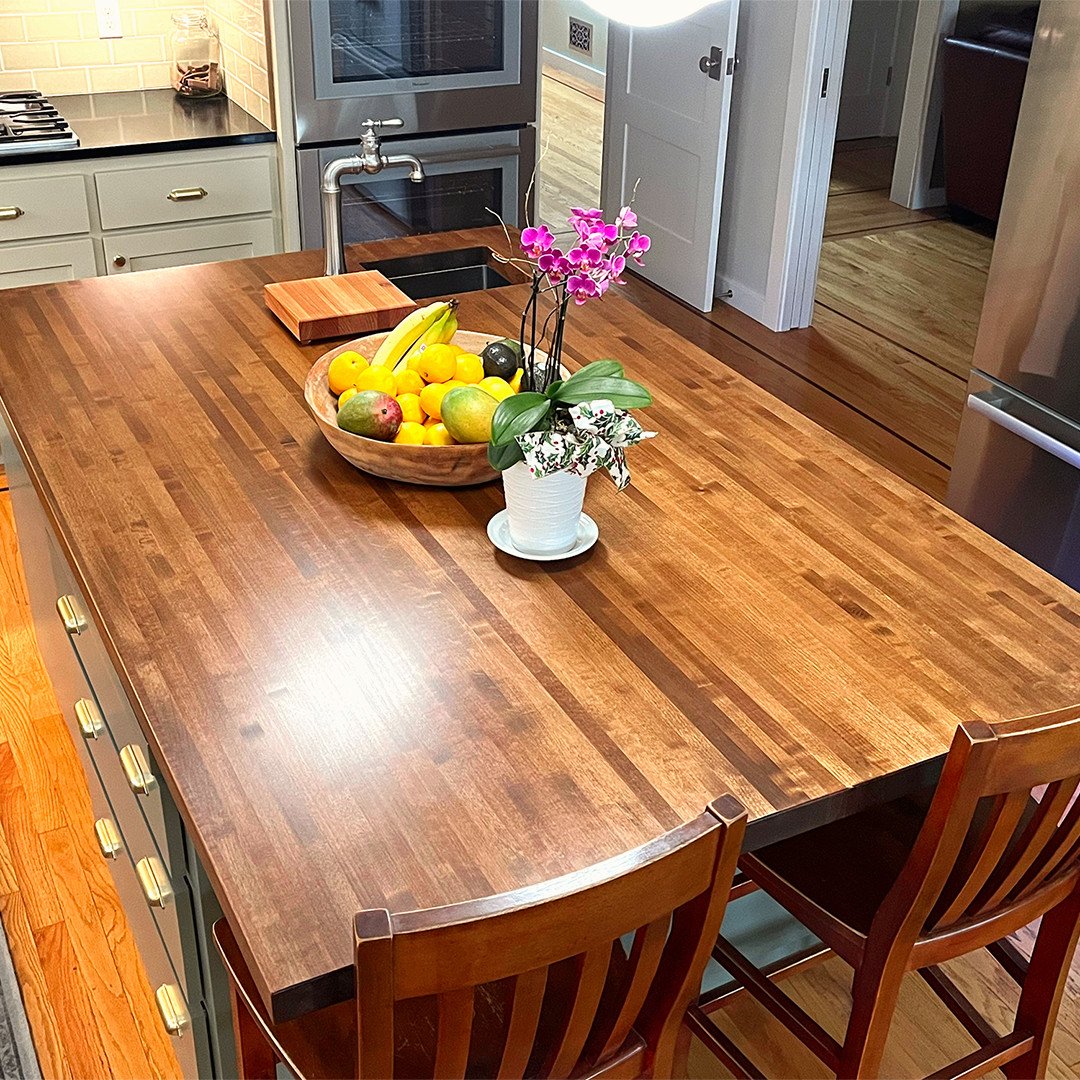
Butcher Block
Butcher block countertops are a popular choice for kitchen surfaces due to their unique look, functionality, and warmth. Here are some of the key reasons why people choose to install butcher block countertops:
Aesthetic Appeal: Butcher block countertops have a warm and inviting look that can add character to any kitchen. They are available in a variety of wood species and can be stained to match any kitchen decor.
Durability: Butcher block countertops are highly durable and can withstand heavy use and abuse and can easily be repaired if damaged.
Functionality: Butcher block countertops are great for food preparation, as the wood is naturally antimicrobial and helps to prevent the growth of bacteria. They are also easy to clean and maintain, requiring only mild soap and water for everyday cleaning.
Warmth: Butcher block countertops add a warm and natural feel to any kitchen, making them a popular choice for those looking to create a cozy and inviting atmosphere.
Versatility: Butcher block countertops can be fabricated into a variety of shapes and sizes, making them suitable for use as countertops, backsplashes, and even cutting boards.
Overall, the aesthetic appeal, durability, functionality, warmth, versatility, and affordability make butcher block countertops a popular and practical choice for those looking to add character and warmth to their kitchen. However, it's worth noting that butcher block countertops may require regular maintenance, depending on what finish is selected.
Contact us today for a free in house consultation.
How To Care For Butcher Block
Butcher block countertops are a popular choice for their warm and natural look, as well as their functionality for cutting and food preparation. Proper care and maintenance are important to keep butcher block countertops in good condition. Here are some tips on how to care for butcher block countertops:
1. Clean spills promptly: Like any other countertop material, it's important to clean spills on butcher block countertops promptly to prevent staining or damage. Use a soft cloth or paper towel to wipe up spills immediately, and avoid letting liquids sit on the surface for an extended period of time.
2. Use a mild detergent for cleaning: For regular cleaning, use a mild dish soap or a dedicated wood cleaner that is specifically formulated for butcher block countertops. Avoid using harsh or abrasive cleaners, as they can damage the wood and strip away its natural oils.
3. Avoid excessive moisture: Butcher block countertops are made of wood, which is sensitive to moisture. Avoid leaving standing water on the surface for long periods of time, as it can seep into the wood and cause warping, staining, or mold growth. Wipe up spills promptly and dry the countertop thoroughly after cleaning.
4. Apply regular maintenance oil or conditioner: Butcher block countertops require regular oiling or conditioning to keep the wood moisturized and protected. Use a food-safe mineral oil, beeswax, or a dedicated butcher block conditioner recommended by the manufacturer to replenish the natural oils in the wood and help prevent drying or cracking. Follow the manufacturer's instructions for application frequency and technique.
5. Avoid direct contact with heat and moisture: Use trivets, hot pads, or other protective surfaces when placing hot cookware or dishes on butcher block countertops to prevent heat damage. Avoid placing wet or damp objects directly on the countertop, as prolonged exposure to moisture can damage the wood.
6. Refinish when needed: Over time, butcher block countertops may develop scratches, dents, or other signs of wear. If the surface becomes rough or discolored, it may need to be sanded and refinished. Consult with a professional for proper sanding and refinishing techniques.
7. Regularly inspect for signs of wear or damage: Periodically inspect your butcher block countertops for any signs of wear, damage, or mold growth. Address any issues promptly to prevent further damage and maintain the integrity of the countertop.
8. Use cutting boards: While butcher block countertops are designed for cutting and food preparation, it's still recommended to use cutting boards to protect the surface and prevent scratches or knife marks.
9. Avoid harsh chemicals: Avoid using harsh chemicals, bleach, or abrasive cleaners on butcher block countertops, as they can strip away the natural oils and damage the wood.
By following these care tips and properly maintaining your butcher block countertops, you can enjoy their natural beauty and functionality for years to come.
Maple
Walnut
Alder
Oak





